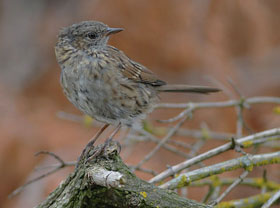There are quite a few examples of scientific names stretching across plants and animals (hemihomonyms). Most of the animals in question are insects and invertebrates, though some are fish, and occasionally mammals (Nelsonia) and birds (Archboldia, Leptosomus).
 In the Western Palearctic, we are blessed with two bird/plant hemihomonymic genera. Prunella can refer to either accentors (birds, e.g. P. modularis, Dunnock) or self-heals (plants, e.g. P. vulgaris, Common Self-heal). Similarly, Oenanthe can refer to wheatears (birds, e.g. O. oenanthe, Northern Wheatear) or water dropworts (plants, e.g. O. crocata, Hemlock Water Dropwort).
In the Western Palearctic, we are blessed with two bird/plant hemihomonymic genera. Prunella can refer to either accentors (birds, e.g. P. modularis, Dunnock) or self-heals (plants, e.g. P. vulgaris, Common Self-heal). Similarly, Oenanthe can refer to wheatears (birds, e.g. O. oenanthe, Northern Wheatear) or water dropworts (plants, e.g. O. crocata, Hemlock Water Dropwort).
The origin of Prunella (plant) is uncertain, though most likely derived from Latin prunum (plum), thus transposing the colour of red plums to the flowers/petals. Prunella (bird) is first mentioned in Gessner’s 1555 Historiae animalium liber III qui est de Avium natura – the scientific term seems to be a Latinization of the German Braunelle (Dunnock).
Oenanthe‘s etymology is straightforward: it is a combination of the Greek oinos (wine) and anthos (flower). Its interpretation when applied to birds or plants is different though. The plant name is interpreted as scent: the flowers of water dropworts have a wine-like smell. The bird name is supposedly first mentioned as oinanthe in Aristotle’s History of Animals, although unidentified; it was thought to appear in the vintage season (Horace) when the dogstar appears (Aristotle), probably in the vicinity of vineyards.
Apart from these scientific hemihomonyms, an English-language species name is applied to two (related) birds and two plants in the British Isles. Redshank is generally used to refer to a bird with red legs (Tringa totanus, Common Redshank, and Tringa erythropus, Spotted Redshank), a plant with red stems (Persicaria maculosa) and a moss with red stems (Ceratodon purpureus). Incidentally, only the scientific name of the moss refers laterally to the colour red (in purpureus), with no reference to the shanks.
